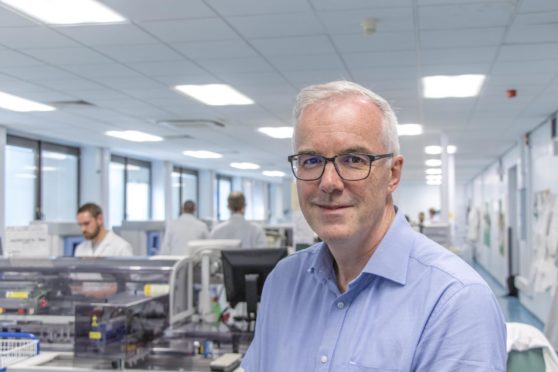Blood disease hepatitis C has been “effectively eliminated” in Tayside, 11 years ahead of target.
NHS Tayside said it is the first region in the world to meet targets for treating infected patients, 11 years ahead of schedule.
The World Health Organisation (WHO) hopes 90% of patients can be diagnosed, and 80% treated, by 2030, which NHS Tayside has now achieved.
The health board is also ahead of the Scottish Governments 2024 target.
Hepatitis C is a blood-borne virus which affects the liver and can lead to cirrhosis, liver failure or liver cancer.
Around 90% of infections occur in people who inject drugs, or have previously done so, through sharing needles.
Lorna Birse-Stewart, chairwoman of NHS Tayside’s board, said: “I am delighted to announce on World Hepatitis Day that NHS Tayside has now also achieved the Scottish Government’s 2024 target of a 90% reduction in prevalence of hepatitis C, making it the first region in the world to effectively eliminate the virus.
“It is testament to the work of the teams involved and, as a Board, we are very proud of them.”
Standard treatments for hepatitis C focus on those who are no longer using drugs or are accessing help services in order to limit the damage done by the virus to their bodies.
But NHS Tayside, working with Dundee University, took a new approach to target people who inject drugs without waiting for them to go on to recovery programmes, to stop them spreading the virus.
Consultant hepatologist and gastroenterologist, Professor John Dillon, said: “Hepatitis C is a life threatening disease which consumes a significant amount of resource in the NHS.
“Previous thinking had been that a community of people who inject drugs and their lives are too chaotic to allow for the sort of sustained treatment that hepatitis C needs to achieve a cure.
“However, our view was that with the right approach, supported with appropriate resources, we could tackle what is a very significant problem and reduce the rates of hepatitis C infection.
“If you can offer treatment at a very early stage, while people who are infected are still actively injecting, when they have contact with other people who inject and share equipment with other people, their chances of transmission disappear because they’re not infected any more. It’s the idea of treatment as prevention.
“The programme started with a single project in a Dundee needle exchange before expanding to multiple research projects and redesign of services to achieve the milestone we have now reached, which justifies the brave decision to support this approach.”
Since testing at community clinics began, NHS Tayside has diagnosed 1,970 people, who are still alive and living in Tayside, and treated in excess of 1,800 people.
Public Health Minister Joe FitzPatrick said: “NHS Tayside should be congratulated and recognised for this achievement.
“NHS Tayside has led the way in developing innovative approaches to tackling hepatitis C, and I commend the hard work and commitment of all involved – it demonstrates the benefits of good leadership and collaborative working, and it will improve the lives of all those affected.”










